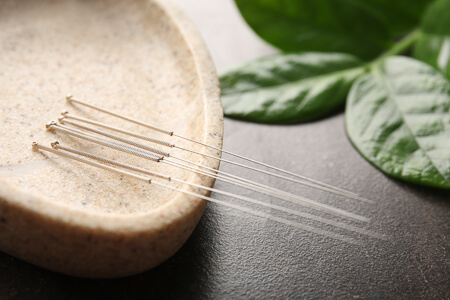Acupuncture in Calgary
How Clinical Acupuncture Works
 This time-tested technique, with a history spanning nearly 3000 years, continues to provide relief and promote wellness for millions worldwide. Our expert practitioner, Dr. Raymond Liu, uses ultra-thin, sterile needles to stimulate specific points on your body. This stimulation:
This time-tested technique, with a history spanning nearly 3000 years, continues to provide relief and promote wellness for millions worldwide. Our expert practitioner, Dr. Raymond Liu, uses ultra-thin, sterile needles to stimulate specific points on your body. This stimulation:
- Increases local blood flow and healing
- Releases endorphins and enkephalins systemically
- Enhances nervous system stimulation
- Promotes muscle relaxation and pain modulation
- Reduces overall stress to the nervous system
Comprehensive Treatment Approaches
Dr. Liu employs a variety of acupuncture techniques to address your unique needs:
Traditional Acupuncture: Our traditional acupuncture services draw upon thousands of years of Chinese medical knowledge. This time-honored approach involves the careful insertion of ultra-thin, sterile needles into specific points along the body’s meridians or energy pathways. By stimulating these points, we aim to balance the flow of Qi (vital energy) throughout the body, addressing a wide array of physical and emotional issues. Our practitioners are experts in identifying the root causes of imbalances and tailoring treatments to each individual’s needs. Traditional acupuncture can be beneficial for managing chronic pain, reducing stress and anxiety, improving sleep quality, and enhancing overall well-being. We take the time to thoroughly assess each patient’s condition and explain the treatment process, ensuring a comfortable and effective experience.
 Auricular (Ear) Needling: Auricular acupuncture focuses on the intricate system of acupuncture points located on the ear. This specialized technique is based on the principle that the ear is a microsystem reflecting the entire body. By stimulating specific points on the ear, we can influence corresponding body parts and organs. Auricular needling is particularly effective for addressing addictions, weight management, and pain relief. The treatment typically involves the placement of very small needles or seeds on the outer ear, which can be left in place for extended periods, providing ongoing therapeutic benefits. This method is often used in conjunction with traditional acupuncture for enhanced results, but it can also be an excellent standalone option for those who prefer a less invasive approach or have limited time for treatment sessions.
Auricular (Ear) Needling: Auricular acupuncture focuses on the intricate system of acupuncture points located on the ear. This specialized technique is based on the principle that the ear is a microsystem reflecting the entire body. By stimulating specific points on the ear, we can influence corresponding body parts and organs. Auricular needling is particularly effective for addressing addictions, weight management, and pain relief. The treatment typically involves the placement of very small needles or seeds on the outer ear, which can be left in place for extended periods, providing ongoing therapeutic benefits. This method is often used in conjunction with traditional acupuncture for enhanced results, but it can also be an excellent standalone option for those who prefer a less invasive approach or have limited time for treatment sessions.
These methods allow us to effectively treat a wide range of conditions, including:
- Headaches and migraines
- Joint and muscle pain
- Chronic stress
- Digestive problems
- Fatigue
- Men’s and women’s health issues
The Center For Healthy Living Acupuncture Experience
We understand that the idea of needles can be intimidating. Rest assured, most of our patients find acupuncture to be surprisingly comfortable, with many even falling asleep during treatment. Our goal is to provide a relaxing, healing experience that leaves you feeling refreshed and revitalized.
Frequently Asked Questions about Acupuncture
How many acupuncture sessions will I need?
Are there any side effects from acupuncture?
Can acupuncture be combined with other treatments?
Experience the Benefits of Acupuncture Today
Ready to explore how acupuncture can enhance your health and well-being? Let us help you tap into your body’s natural healing potential and achieve optimal wellness. Book today!
BOOK APPOINTMENT

